#regardless of variation of practice
Explore tagged Tumblr posts
Text
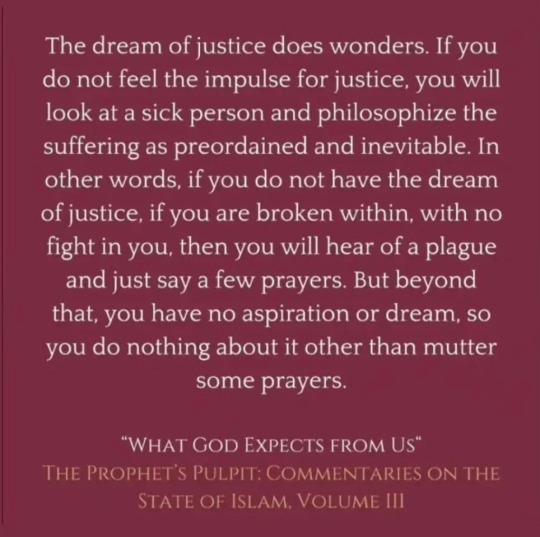

“What God Expects From Us” The Prophet’s Pulpit: Commentaries on the State of Islam Vol iii
#saw this on ig the other day#it made me cry#I’m not a Muslim#but this year it was Muslims and it was their principles their steadfastness and their unity as Muslims#regardless of variation of practice#that showed me what it means to be principled and fight for justice#and when I felt lost in my ‘settler void’ I believe I know why that is now#and I do not respect the dogmatic atheism of the west#I do not respect spiritual voids#this year after everything I’ve witnessed even as a settler in the imperialist core I’ve realized what real justice and real unity means#when I see the resistance axis and the devout Muslims and know their Al Thawabet#I know for certain now that everything I’ve been borne from here in the settler state of US is what is demonic#and all the Islamophobia is an intentional evil#and a few months ago I heard ‘a voice’ of a higher power for the very first time#and I never felt that before in my life#I had a thought then that I could never pray for someone without taking action#and I had no idea that this was a principle in Islam#people have said that a theologians natural conclusion is Islam#I’m not a Muslim but they have my respect for life
1 note
·
View note
Text
dr. jacobo grinberg, the scientist who went missing for researching shifting 🗝️

the man, the myth, the legend. being a keen enthusiast of the human brain from a young age, dr. jacobo grinberg was a mexican neurophysiologist and psychologist who delved into the depths of human consciousness, meditation, mexican shamanism and aimed to establish links between science and spirituality.
grinberg's theories and research can be tied to reality shifting, seeing as he explored the fusion of quantum physics and occultism. being not only heavily established in the field of psychology but also a prolific writer, he wrote about 50 books on such topics. he was a firm believer of the idea that human consciousness possesses hidden and powerful abilities like telepathy, psychic power and astral projection.
the unfortunate loss of his mother to a brain tumour when he was only twelve not only fuelled his interest in the human brain but also pushed him to study it on a deeper level, making it his life’s aim.
he went on to earn a phd in psychophysiology, established his own laboratory and even founded the instituto para el estudio de la conciencia - the national institute for the study of consciousness.
despite sharing groundbreaking and revolutionary ideas, his proposals were rejected by the scientific community due to the inclusion of shamanism and metaphysical aspects. on december 8th, 1994, he went missing just before his 48th birthday. grinberg vanished without a trace, leaving people thoroughly perplexed about his whereabouts. some believe he was silenced, while others believe he discovered something so powerful and revolutionary that changed the entire course of reality, or well, his reality.
grinberg's work was heavily influenced by karl pribram and david bohm's contributions to the holographic theory of consciousness, which suggests that reality functions the same way as a hologram does. meaning, reality exists as a vast, interconnected macrocosm. it even suggests that all realities exist among this holographic structure.
lastly, it also proposes that the brain does not perceive reality, rather actively creates it through tuning into different frequencies of existence.
this not only proves the multiverse theory (infinite realities exist), but also the consciousness theory (we don’t observe reality, but instead create it).
grinberg’s most notable contribution was the syntergic theory, which states that, “there exists a “syntergic” field, a universal, non-local field of consciousness that interacts with the human brain." - david franco.
this theory also stated that
the syntergic field is a fundamental and foundational layer of reality that contains all possible experiences and states of consciousness.
the brain doesn’t generate consciousness, it instead acts as a receiver and its neural networks collapse the syntergic field into a coherent and structured reality.
reality is created, not observed.
we can access different variations of reality (which is the very essence of shifting realities)
the syntergic theory is even in congruence with the universal consciousness theory (all minds are interconnected as a part of a whole, entire consciousness that encompasses all living beings in the universe).
grinberg concluded that
all minds are connected through the syntergic field
this field can be accessed and manipulated by metaphysical and spiritual practices, altered states of consciousness and deep meditation.
in conclusion, the syntergic theory proposes that our consciousness is not a mere byproduct of the brain, but rather a fundamental force of the universe.
grinberg was far ahead of his time, and even 31 years after his disappearance, the true nature of reality remains a mystery. regardless, the syntergic theory helps provide insight and a new perspective on how we access and influence reality.
summary of grinberg’s findings:
the brain constructs reality
other realities exist and can be experienced
other states of consciousness exist and can be experienced
consciousness is not limited
all minds are connected through the syntergic field
shamanic, spiritual, metaphysical and meditative practices can alter and influence our perception of reality.
some of grinberg's works that can be associated with shifting:
el cerebro consciente
la creación de la experiencia
teoría sintérgica
#reality shifting#shifting#shifting realities#desired reality#shifting motivation#shifting blog#shifting community#shifting antis dni#shiftblr#shifter#shifting to hogwarts#loassumption#loa tumblr#manifesting#robotic affirming#shiftingrealities#anti shifters dni#quantum jumping#quantum physics#shifting advice#neville goddard
2K notes
·
View notes
Note
How to deal with the homophobic and horrible ss, nh, sh etc. stans? Just reading their content makes me feel gaslighted and makes me want to quit my little sns blog, because I feel isolated.
First of all, I'm sorry you feel that way. The best thing to do is honestly to just ignore them. The canon ships, in particular, are horrid and are consequently routinely subjected to lots of criticism by people outside of the carefully constructed echo chambers of canon shippers. SS/NH fans cope with this by harassing SNS shippers who have been a particular source of insecurity for the entire run of the show. There's a reason why they routinely steal from the sns dynamic to prop up their ship and have to rely on fillers and novels and databooks, etc. instead of working with the manga.
This brings me to my next point. Part of the reason they are so emboldened is because the "victors" are the ones who write the story, and they've used this to control the narrative and recontextualize what actually happened during the original run of the story. So, something you should know is that SNS fans have always been right about the core of the manga.
While there were obviously endgame SS/NH believers, the idea that Sasuke/Sakura and Naruto/Hinata were mutually in love was not a unifying factor in those fandoms.
In the Naruto Collector Book 3, there was an interview in which Kishimoto himself acknowledged the fact that Sakura and Hinata's feelings of love were unrequited. This interview is practically lost media, and is conveniently never discussed but the book is still available. The collector series has other interviews with Kishimoto as well.


But the main point is that this interview was released in 2007, long after we were already into Part 2 of the manga. This firstly debunks the idea that there was a secret budding love story that was sabotaged by SP, though you don't need any interview to tell you that Sasuke literally only thinking of Team 7 during Sakura's love confession, or Naruto not reflecting on any special moments with Hinata was proof enough of the lack of romance. More importantly, however, this is connected to my point about belief in "true love all along" was not a unifying factor in the SS/NH fandoms. Many of them were aware of this interview (see the respective examples of a SS fan and a NH fan reacting to it below) and thus spent their time taking solace in databooks and writing longwinded posts about how mutual romantic development weren't required for endgame.


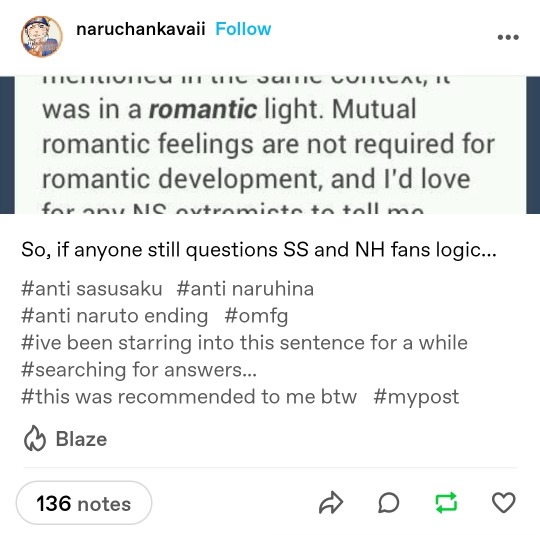
What DID unite solo/multshipping SS in particular was the belief that Sasuke considered Sakura special, and thus, she would be the one who helped heal his heart. And this belief is where the real "war" between SS/SNS lied. If you look at old SNS posts, you'll see that there was never a unifying belief that SNS would be canon either, for obvious reasons. You'll notice that many posts were prefaced with some variation of "regardless of the nature of their bond...." because it wasn't so much what they were to each other rather than how significant they were to each other. You'll see a lot of posts about them transcending traditional relationship categories.
So this was the primary context in which SS and SNS fans argued. You can see below just some of the drivel that SS came up with. They have always been relentlessly insecure harassers who used to attack SNS fans for simply seeing the direction in which the manga would go.


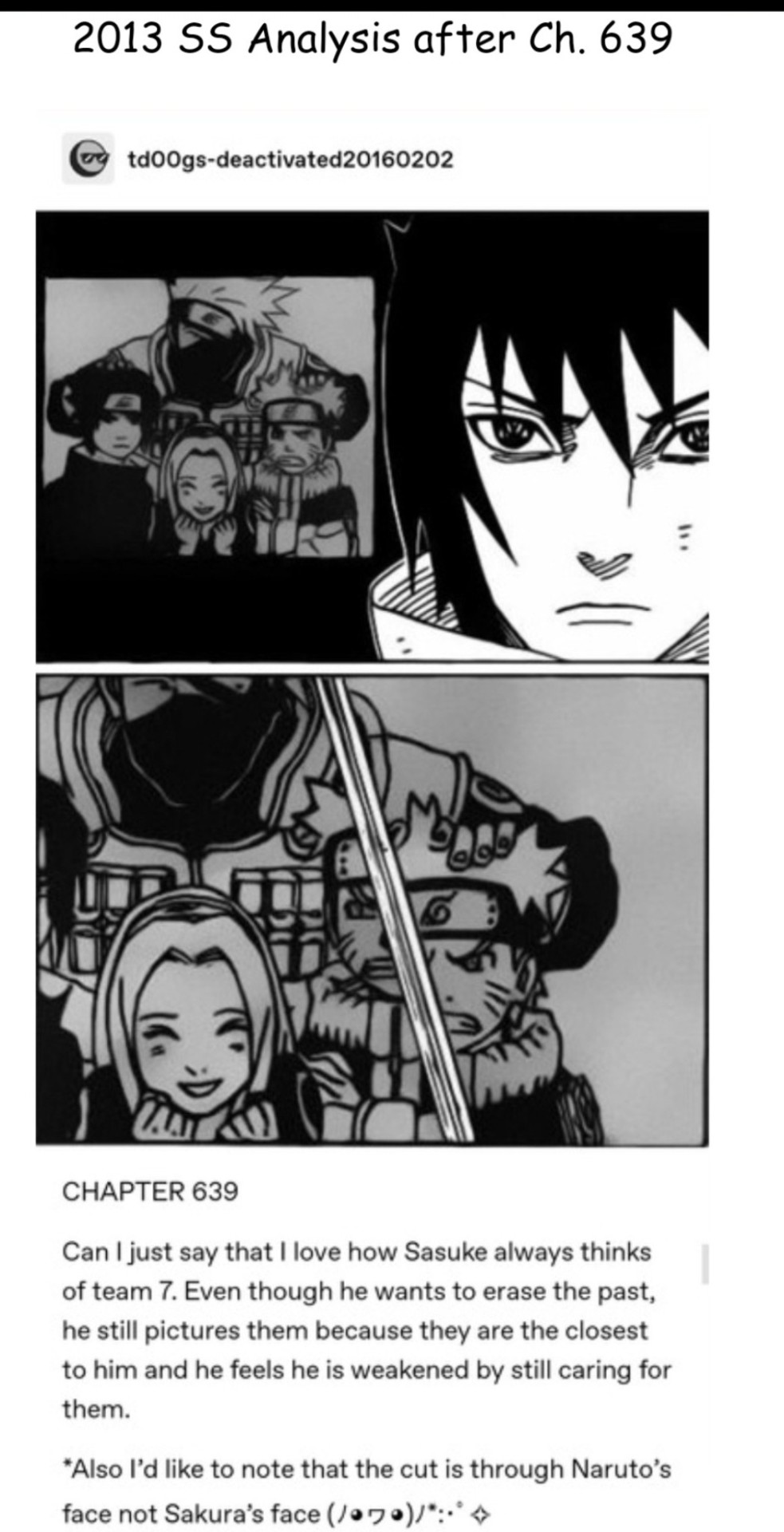
They ignored Naruto making Sasuke's heart beat repeatedly, they ignored Naruto being tied to Sasuke's sharingan transformation — which later in the manga was explicitly called out for being the reflection of the heart that SNS fans postulated it was. They ignored the fact that Sakura was rendered fungible [a fact you can see reflected in the interview below when Kishimoto discusses what makes Team 7 special and completely evades mention of Sakura] and that Kishi usurped moments that could have been special for Sasuke and Sakura by including Naruto (eg. Sasuke bringing up not wanting Naruto to worry in the FOD, Sasuke thinking about Naruto to keep the curse mark at bay as well despite the fact that Sakura was the one who was explicitly worried about him, Sasuke including Naruto and talking about precious nakama in the fight against Gaara despite the fact that Sakura was the only one in mortal danger, etc.). They ignored the fact that Sasuke quite literally hierarchially ranked Naruto as a more intimate friend than Sakura. Harassed SNS fans for pointing out the basic setup in the manga that served to reinforce SNS fans' interpretations because they constructed a version of the manga that was wholly centered on the special and unique "bond" between Sakura/Sasuke.
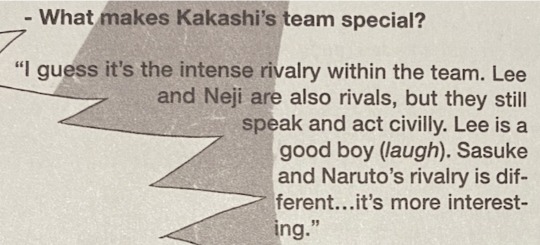
All this lasted to the war arc. They twisted themselves in pretzels to argue about how Sasuke leaving Sakura to burn in lava and outright stating that her and Kakashi's lives didn't matter was him repressing his super secret feelings of care for her while attempting to downplay the mutual affection displayed in the SNS bond. Even the more "neutral" pro team 7 SS fans looked for ways to subtly denigrate SNS' bond. Sasuke makes no mentions of Sakura when the 10 tails is about to blow up the shinobi alliance? Who cares because at least Sakura's face doesn't have a cut across it (yes, they really did misinterpret pro SNS moments where Sasuke individuated Naruto as negative). And they did all this while making anti Sasunaru clubs and hiding in forums to complain about how SNS was getting too much focus in the manga (something older fans can attest to) because deep down many of them saw the writing on the wall.


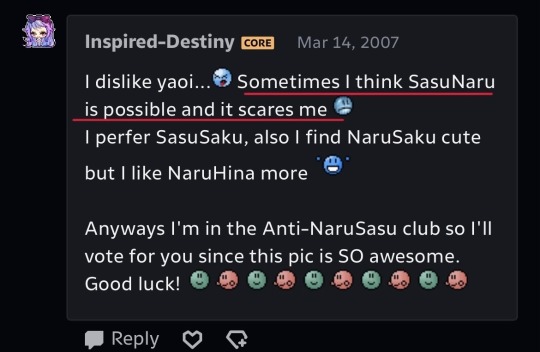
Now SNS fans, on the other hand, displayed the critical reading skills that the SS fandom lacked — and I don't mean that facetiously. They picked up on the fact that it was significant that Sasuke lost control of himself when Naruto showed up. They understood the significance of Sasuke specifically asking about the status of the 9 tails given the prior context of Sasuke specifically needing to kill Naruto because he wanted to become stronger. They recognized that Naruto was specifically singled out with a cut precisely because he was special by picking up on the patterns peppered throughout the text. They also respected the Team 7 bonds established in Part 1 — they had no need to undermine it because there was a confidence in Naruto/Sasuke's relationship being special — while understanding the disadvantage in the fact that Sasuke and Sakura dynamic always included a "we" (see example from a 2008 analysis below). They knew there would be a reconciliation in which the tension between duty and desire would be resolved and would lead to Sasuke accepting his heart/inner child which would lead him to Naruto.

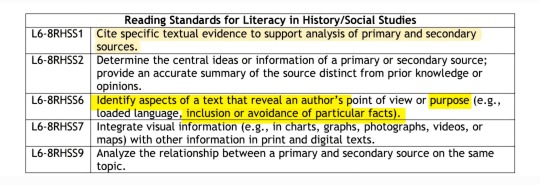
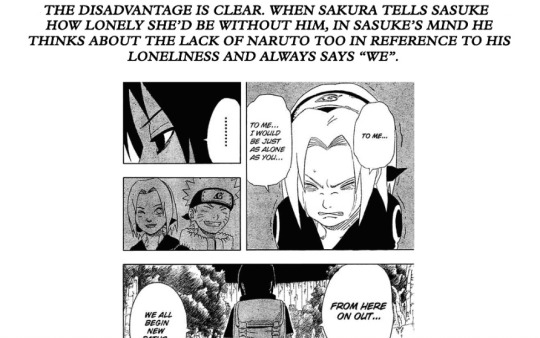
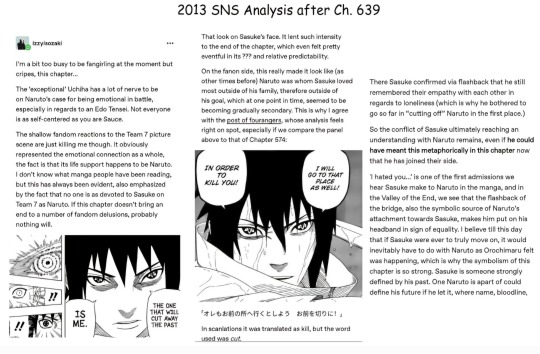

And lo and behold, 698 came and SNS fans were validated while SS fans were livid and angry. They complained and harassed SNS blogs and threw tantrums and cried about the manga being retconned. It's so easy for them to pretend they knew everything in hindsight, but the receipts don't lie. There has never been anyone more in denial about the core facts of the manga than SS/NH fans. Don't let them prevent you from supporting SNS. The SNS bond was validated.
Even to this day, they have never gotten over the fact that Sasuke confirmed their worst nightmares which is why they have to cope by literally cropping Naruto out of panels (Look at the 97 likes — and this is tame for them), spreading poor translations, and taking glee in the idea of Kishimoto not being the arbiter of canonicity, so they can take refuge in material not written by him, because they hate what he did write.
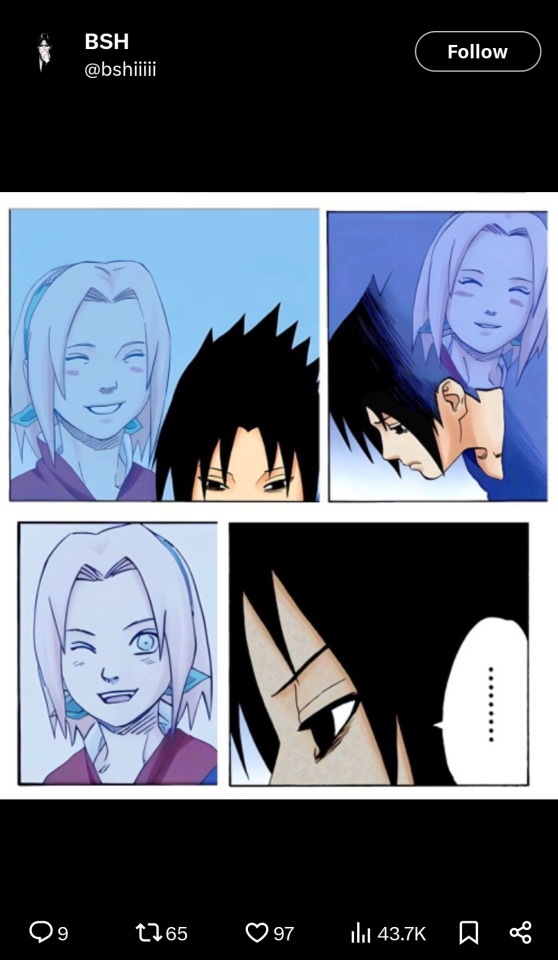

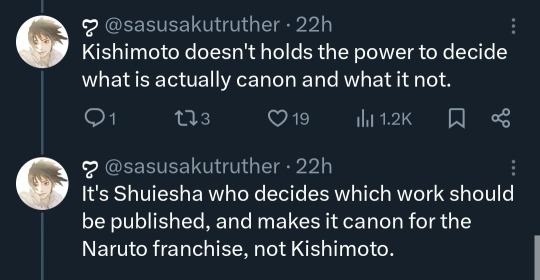
As I type this, they are getting made fun of in different languages and SS fans are coping by pretending that anyone who points out the dysfunction of their implied no kiss couple has has no literacy and is ignoring 700 chapters of development, the development in question being Sakura still acting infantile while Sasuke remains indifferent.
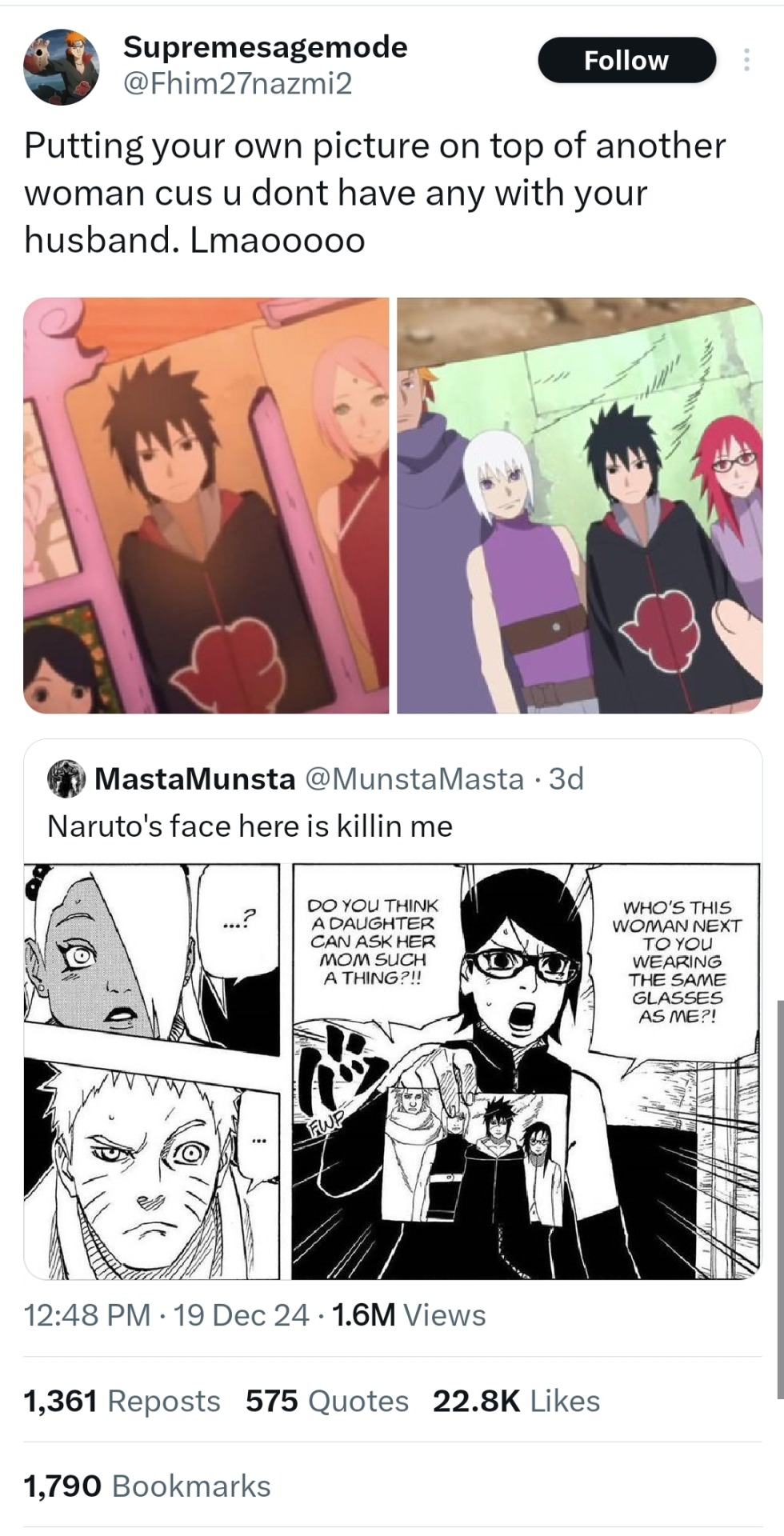
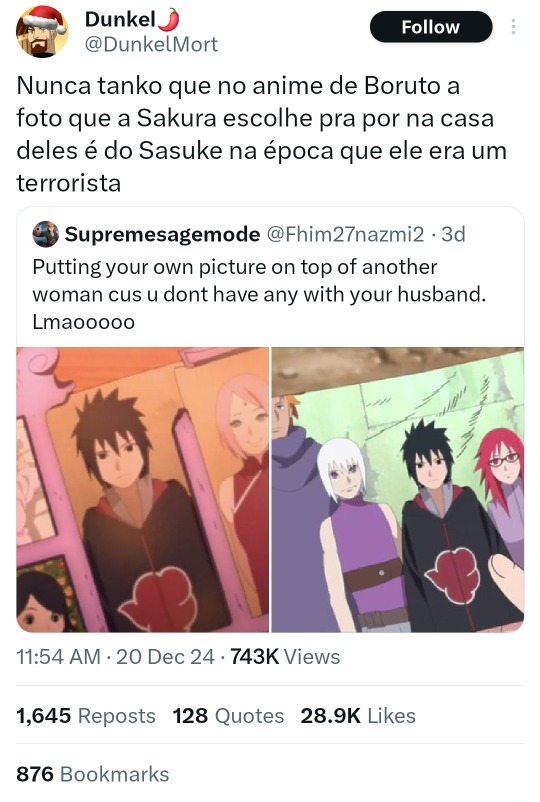



Why should you feel isolated because you want to support the main bond when SS fans even have to lie about the poorly written filler novels that were expressly created FOR them (eg. Sakura forcefully kissing Sasuke and then Sasuke immediately grabbing Naruto and leaving Sakura to fall off the motorcycle they were all riding on; A scene SS fans repeatedly lied about and repeatedly misrepresented).

Unfortunately I've nearly run out of images and I didn't even get to finish highlighting all of the lies of SS or discuss NH fans the way I wanted too but please, don't worry about the hate and the homophobia. A significant part of it is them lashing out because of insecurity.
Then and now, nothing has changed.

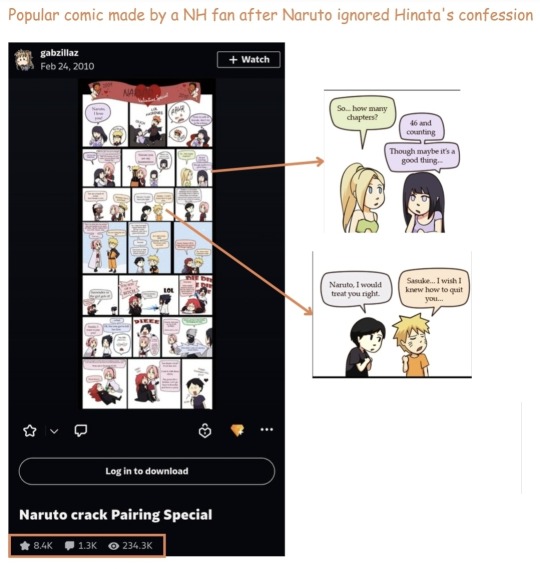

They hated the fact that Kishimoto wasn't concerned with Hinata's unrequited feelings and patiently waited for Sasuke to fade into oblivion so Naruto and Hinata could ride off into the sunset. When that didn't come, and Naruto prioritized Sasuke even after Hinata's confession, they took to harassing SNS fans. All they have is a retcon movie that Kishimoto wasn't even devoted to, which is why, in addition to lionizing scenes from the film, they even have to read panels incorrectly to achieve some satisfaction.

SNS is amazing and enough to keep me occupied, but another way of dealing with the hatred and homophobia (which is the main point of this post) is remembering why it's so rampant in the first place. The reason you feel gaslighted is because they are literally trying to rewrite history (these people have even lied about how much their novel sold and had to be corrected by a sale tracking account).
I haven't even scratched the surface, but you can see a few more examples here, here, here, and here. Giving in to their bullying is how the liars win. Don't let them!
182 notes
·
View notes
Text
January Check In

Hello, all!
Happy update day, catfolk! We apologize for the late update, but we wanted to share the Beta dates with you in this update. We took extra time to ensure the dates were accurate without risking something not being ready in time or causing burnout for our team. We’ve done quite a bit of internal assessment on the pros and cons of letting ~2,000+ people into the game.
Our most pressing thought was how to reconcile needing to continue working on key features while getting valuable feedback and play data on all that we already have. There was a lot to consider, in reputation, timeline, and team morale. We did not want to give the wrong impression that we felt anywhere close to a done game, but we have a lot of high fidelity mechanics and playability to share which need high population testing regardless. We’ve finally settled on rolling our sleeves up and opening to testers. At the start, we’ll provide a comprehensive breakdown of everything we’re planning to add over the months of the test, and continue our monthly check-ins on our progress. We’re ready to grind, and we hope you are too! And in many ways, it will be much nicer to get the comprehensive mass testing whenever we have something new to roll out!
We hope you will all agree that this update was worth the wait, as we have exciting news to share with you today, along with our most exciting news yet! :)
Accessory Progress
We are proud to announce that we have 47 unique accessories, altogether with 564 color variations.
We have just about reached the edge of our odyssey in the first production run of accessories. After 8 months of practice and training for our fledgling team, we’ve improved immensely at our pipeline. What has previously taken us months now takes a matter of weeks. We have one more backer accessory to develop, and any additions in the near future will be small, simplistic items in comparison to our full sets, but I’m very proud of the team for how far we’ve come, and the marvel of quality they produce in good time.
This month’s new progress includes:
Frog Friends

Illustration by Remmie, sponsored by Hag
Protogear Recolors

Recolors by Emma
New decor
We’ve also been busy with decors.
Argh, matey!

Macaws by Jersopod, cannon, barrel and newspaper stack by Giulia and Remmie
In addition, style compliant sketches of the original rose decor!

Sketches by Remmie
Archetypes
We’re here to introduce a very exciting mechanic that has been in the works since our initial overhaul. It’s one of my personal favorite concepts, and the primary motivation behind how we’ve structured the cat design system.
Introducing… cat archetypes!
Archetypes are a specific combination of traits which, when fulfilled, mark the cat’s profile with a badge and reward the user as an achievement fulfillment. (If the cat’s traits are changed, the badge will be removed. Cats may fulfill multiple Archetypes simultaneously.)

For example, this badge means the cat fulfills the Ruby archetype, a badge which requires the cat to have the color Ruby in all slots.
Examples of the Ruby archetype include:



To give examples of the specificity, other Archetypes include for example “Leopard,” which must have the following to comply:
A Yellow range Leopard overcoat
Light Greyscale or Light Yellow undercoat
Yellow or Greyscale Claws
None for the second accent
Here are some Leopards!



Owning these cats will give the user rewards, sometimes completely custom to the Archetype.
What we hope to achieve with this system is a greater incentive to think creatively within the restrictions of our cat builder, and to reward our players for intentioned play in collecting, breeding, and designing a variety of cats. After all, it is the core of the game!
And with each new addition of colors or patterns, we’ll release an onslaught of new Archetypes! We plan to introduce a healthy amount of them, some easy to get, and some harder depending on genetic obtainability and the obtainment method.
This system is already up and running on our servers, and is in its infancy. We’ll get a lot of data from testing it out!
Originally, this system was on the backburner while we focused on bigger picture mechanics, but we’ve fast tracked it so we can bolster and better encourage casual play while the Guild system is still in its preliminary beta state.
Pelt System
Perhaps the feature we are most excited to see in use and tested is the Pelt System, which we briefly introduced in the 2024 November Check In. There is a frankly insane amount of functionality behind this feature, which includes autonomous user decision and interaction every step of the way.
First, we were able to implement dynamic layering. This means that Unclipped (top layer) pelts can actually sport layers which are placed behind the cat automatically. Valuable uses for this feature include the inside of sleeves, backs of hoods, and items which you would otherwise always want to go behind anything it’s stacked above.
Users can view their pelts already submitted, see their submission progress, choose to submit more to the pelt, choose to print their pelt themselves, choose to list pelts for buyers to print on demand, and view their pelts on any cat.

There is also a draft system which allows users to store information they aren’t ready to submit yet.


Users can list pelts as a print-on-demand resource, and are able to control how many copies they will allow to be printed.
All prints will require a tax which will be dependent on the coverage %, calculated based on the amount of pixels that cover the canvas. This means that small pelts, like a hat or a monocle, will take only a small tax!

AND we have a rudimentary tagging system going as we experiment with this feature! Big news! Once we iron out the kinks, we’ll be able to roll out user filtering and tagging of other content, such as cats or forum posts.
And drumroll please…
As teased at the beginning of this update, we are overjoyed to announce the Closed Beta dates! Early access launches on February 3rd, with the regular Closed Beta starting on February 6th!

During the Closed Beta, you’ll have the chance to experience many new and polished gameplay features, exciting customization options, and the now refined economy! We encourage all testers to not only find any potential bugs and ui improvements, but also to provide feedback and suggestions on all of our game features and our economy!
All 253 Early Beta, 1940 Beta and Kickstarter codes have been generated, and we will begin sending them out shortly over the next day.
In the coming week, we’ll put out writings on our expectations early on and the features roadmap that we’re currently staring at. We can’t wait to see you all in Kotemara soon!
To summarize: We shared decors, Protogear recoloring, Frog Friends, pelt system showcase, archetypes and closed Beta dates.
What to expect next month: Further asset and development updates. Check-ins for how closed Beta will be going.
#paw borough#pet site#virtual pet#indie game#petsite#pet sim#development update#art update#pawborough#kickstarter update#closed beta#beta#beta test#kickstarter rewards
91 notes
·
View notes
Text
⎯⎯⎯⎯⎯⎯⎯⎯ ✰ ⎯⎯⎯⎯⎯⎯⎯⎯
☆ 𝐓𝐘𝐏𝐄𝐒 𝐎𝐅 𝐃𝐈𝐂𝐊 | 𝐓𝐑𝐈𝐎 𝐋𝐈𝐍 𝐊𝐔𝐄𝐈 ☆
⎯⎯⎯⎯⎯⎯⎯⎯ ✰ ⎯⎯⎯⎯⎯⎯⎯⎯
TW: smut, dick description, sucking balls, afab anatomy.
✰ 𝐁𝐈 𝐇𝐀𝐍 ✰
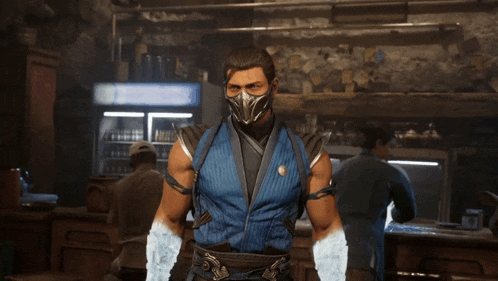
He has a 20-centimeter dick, with a wide length, two veins stand out on the member - one that starts in his groin, going down to the dick a little thinner, and a second vein, which pulsates and is visible when he stands on his side hard dick. It's a darker color than his skin, a tone down at least, a light brown, with the tip of the dick circular and a little darker too, reddish, it's also a little crooked to the right, little but not much visible. Bi Han's dick is a little different, his body temperature itself is a little colder, that is, his dick, even though it is hard and pulsating, is still a little cold, so when you fuck he leaves his dick inside your mouth or pussy, as it is more sensitive due to body temperature, the sensation is a little different, but you soon get used to it. He is more sensitive at the tip, so you can use vibrators or suck using special lubricants - his favorite are those with a mint sensation, he moans like a desperate little slut looking for the heat of your pussy -
BASE COLOR: #E2711D | STEM COLOR: #9B3D12 | COLOR OF THE TIP OF HIS DICK: #650D1B

✰ 𝐓𝐎𝐌𝐀𝐒 𝐕𝐑𝐁𝐀𝐃𝐀 ✰

His dick is 22 centimeters, being a completely straight dick, he has a lot of veins, whether they are thicker or thinner - the thick ones are more prominent because they are practically purple, you can see and feel the blood pulsing and circulating over his member. Tomas, it's a very pleasant feeling to give him a handjob - making his dick even fatter and thicker. The color of his dick is a lighter cream, practically vanilla, the designs on his member are like a pattern, going all the way to the tip which is a little more V-shaped, meaning he can easily hit your lap. uterus - the tip of his dick is a light pink, with small variations at the edge, going to a more vibrant pink, with the middle of his dick going to a very light pink before reaching the tip. Tomas is sensitive to the entire dick, regardless of tip or base, he will come quickly anyway, if he becomes overstimulated he will lose control of the smoke magic, and a thin, dark aura will begin to surround his body, especially when you ride his dick in "cowgirl" position.
BASE COLOR: #FACBEA | STEM COLOR: #FFE4D6 | COLOR OF THE TIP OF HIS DICK: #E966A0

✰ 𝐊𝐔𝐀𝐈 𝐋𝐈𝐀𝐍𝐆 ✰

He has an 18 centimeter dick, but his dick is thicker, that is, he can fill you completely, his dick has few or almost no visible veins, but the few he has are very thin, with an extremely hot blood flow , his dick itself is much hotter than most men's. His dick has a light woody color, with a slightly lighter base, going with a light brown gradient and a strong red at the tip of his dick, his dick is also crooked to the left, very crooked, but that's it. It also helps to reach the right spots on your pussy. He is sensitive at the base, but specifically in the balls, which are also extremely soft and warm, he likes to see you massaging his balls or even having you suck them while he jerks off, looking at you there, underneath him using With your tongue, his dick heats up in your holes, especially if he's close to cumming, that is, it's an extremely good feeling, making you squirt on his dick.
BASE COLOR: #FFBD40 | STEM COLOR: #C47E38 | COLOR OF THE TIP OF HIS DICK: #DF0000

©YANDERESTARANGEL 2023

#yanderestarangel#mortal kombat#tw smut#mortal kombat fandom#mortal kombat fanfiction#mortal kombat smut#mortal kombat x reader#mk1#mortal kombat headcanons#smut headcanons#headcanons#mk headcanons#mk1 headkanons#bi han x reader#bi han headcanons#bi han mk#bi han sub zero#bi han#tomas vrbada headcanons#tomas vrbada x reader#tomas vrbada mortal kombat#smoke tomas vrbada#tomas vrbada#kuai liang mk1#kuai liang headcanons#kuai liang#kuai liang x reader#kuai liang scorpion#mk1 smut#kuai liang x you
1K notes
·
View notes
Text
i've never quite understood the "make an oc if you're gonna mischaracterise them" argument.
and not only because we all have different interpretations or because characters are going to look different when put into different situations, or that you should engage with the ones you enjoy instead of hating on the ones you dislike
but also because,,, emotions? yk?
take remus for example, he's my favourite character. i'll read more canonical characterisations of him, and i'll also read ones where he's completely different. but going into each fic, i already have alllllll of the emotions that i hold towards him, you know? i have the love for this character that's been crafted over years and over the books and the films and the countless fics etc etc - i wouldn't have that with a random OC i created.
so maybe in some fics he's a lil different than he was in canon but (1) that's what i find fun in fandom (exploring different interpretations and scenarios and viewing the same books through thousands of peoples' eyes) and (2) i don't think that that characterisation can be classed as "practically an OC" when that character and my engagement with him is based on my emotions? does that make sense? if it was some rando called bob, i wouldn't have that connection and my engagement with the character wouldn't bring me the same joy as engaging with one i already love, regardless of portrayal.
idk in my mind it's kinda the same concept as how some people struggle with reading published books after fanfiction because you're not already emotionally invested. i don't care if a character is "ooc" in a fic, if we all used the same remus for every fic with no variation whatsoever it would get incredibly repetitive and boring, right?
#does that make ANY sense?#inspired solely by one of my tiktoks that mentions fandom etiquette#and so many people in the comments are like 'dldr unless they're practically an oc and then i can be mad'#like... no? nononono#'why should we be okay with mischaracterisation?'#idk is there a gun to your head? are you being tied down and forced to read it#no? okie :3 so we can use our thumbs and scroll right?#why would you WANT to be mean that makes no sense to me like ??? why would you want to be mean#robrauders yap
98 notes
·
View notes
Text
I've been coming across discussions about why Tommy calls Buck "Evan". The short answer to that question is probably just that the showrunners like using it as a shortcut to create a connection between people. Some may find that cute, others may say it's artificial. Ultimately, it's a matter of opinion.
Some people believe Buck is happy with Tommy calling him Evan because for the first time he gets to be called Evan without any of the baggage attached (which might be a naive and overly romantic take, who knows). Others argue that it's rude for Tommy to call him that, saying he's unaware that Buck prefers his identity as Buck to distance himself from childhood trauma, that it symbolizes that he doesn't really know Buck all that well (and, well, of course he doesn't. That's kind of how getting to know someone works. He literally says they practically know nothing about each other during the coffee date. He's aware, not at all pretending to know Buck better than he does. I also feel that with this take, one should be careful not to take agency away from Buck. I highly doubt he would just let it happen if he minded it).
Here's my opinion on the matter: I think both names are a double-edged sword for Buck. The downside of "Evan" is that it represents his time before he became a firefighter which unfortunately is linked to a traumatic childhood. The upside is that it also represents his softer side, the part of him that isn't just a tough firefighter.
The upside of "Buck" is that it felt like a fresh beginning. Not to mention that it sounds cool, the name of a badass guy, which is definitely something Buck wanted to be in S1 (1x2 "You just have to be particularly badass which, you know, I am."). But the name "Buck" also has its downsides. It's not a name he chose for himself. There were three other Evans in his class and he wasn't the main Evan, the one allowed to keep his name. He didn't even get a variation of it. He tells Maddie about it in a PS with an "I kinda like it." (4x5).
It seems like the nickname originated from him not being the first priority again, which is a pattern that has followed him his entire life. Luckily, it worked out well because he likes what the name symbolizes. To me, Tommy calling Buck "Evan" could represent that Buck is his first priority. He is the one and only Evan for Tommy.
As much as Buck loves being a badass firefighter, he also wants to have an identity and value outside of that role. Buck is badass. Evan is soft. Both are good. Regardless of how things end, Tommy is and will always be the one who made him realize that he's allowed to like both. I'm likely reading too much into it but it’s nice to think that these steps in Buck's journey are linked.
#evan buckley#evan buck buckley#tommy kinard#bucktommy#tevan#911 meta#911 abc#911 show#9-1-1#911#my posts
66 notes
·
View notes
Note
I came across that silm nobel prize argument you mentioned in yr tag. I’m not asking about the ship war stuff, I know you don’t do ship stuff but only if you don’t mind, I was interested in hearing yr thoughts on the accessibility stuff they were talking abt, like what makes a fanfic acessible. I was thinking of your post on making your AU acessible for a fanfic reader, and it made me think that the nobel prize OP was using the word inacessible in a wrong way?
I assume this refers to that ‘Silm writers are inaccessible & elitist compared to TROP writers, nobody wants to write an essay about the fanfic they read, flower shop AUs have more ‘real human emotion’ than thematically dense fic, it’s AO3 not the Nobel Prize longlist’ nonsense unless there’s another one floating about in which case jesus fucking christ lol
It’s an interesting one lol… I don’t follow the page or post about the show so I didn’t see it, but a bunch of people have DMed it to me across the last couple weeks, since while the OP was speaking in general or collective terms, I tick a few of their shitlist boxes in a rather obvious way lol. I’ve said variations of this across said DMs and other writers may have a different opinion but essentially:
I personally don’t treat ‘accessibility’ as a concern when it comes to fanfic, unless we’re talking disability accommodations like alt-text or not using emojis, or tagging for triggers. ‘Must be enjoyable for people who like a certain style of writing’ is not an accessibility requirement, it’s your Goodreads wishlist. I do not care about what you want Santa to bring you. Perhaps it’s because I’ve not been in fandom long enough but I genuinely cannot think of a response aside from ‘get a fucking grip lol’.
And re your question about my AU, what I meant there by adapting the story for a fanfic audience was that I toploaded it with regional context and diaspora eyes before getting into the actual narrative in a way I wouldn’t have done if (god forbid) I wrote it as a novel. That isn’t a comment on style or theme, it’s literally just because I’d expect that someone walking into a bookshop, picking up, and paying for a book about a Marxist madhouse in North Kerala full of intertextual elements so thinly veiled as to be practically wrapped in clingfilm, would be at least vaguely familiar with the genre and context.
This is something I would not assume of people scrolling through AO3, because there’s no reason to expect that, hence providing extra info, being conscious as to what I can’t presume people already know, putting some extra elbow grease into “world building”, translating within the text itself, answering questions about regional/historical context etc… it’s not an accessibility measure, I’d say it’s closer to providing an appendix/glossary.
I don’t know, like imo it’s kind of ridiculous to sit around shitting on people for writing narratives more complex than what you personally like, but that’s your space, preference and prerogative… go ham and shit away, it is your toilet, not mine.
My irritation is mostly with the language of “accessibility” and “elitism” and trying to make it sound like a societal ill by using such buzzwords. Yes, there may well be elitism or lorebros or whatever in a general fandom sense, but I don’t know what fanfic has to do with that.
The Silmarillion probably does have a higher concentration of whatever they mean by Nobel Prize fics but that’s not exactly due to some oppressive feudal fandom hierarchy, it’s literally just because the fanbase skews older and the source text is conducive to a certain style of literary writing being relatively popular… it’s not some big injustice, it’s pretty normal, generally speaking, for fanworks to reflect the style and tone of the source text regardless of how transformative they are, simply because the one thing most people in any given fandom share is their enjoyment of said source text.
I like to think of myself as being well read but there are tons of books ‘inaccessible’ to me beyond reading preferences. When I was at university I worked on regional literature but I always specified Malayalam rather than ‘South India’ even though the college used the latter as a tag, because I can’t read Tamil or Kannada etc—that doesn’t mean those languages are inaccessible languages. One’s experience as an individual is not a benchmark for something already as subjective as accessibility. I’m not exactly going to call the Dance Mums fanbase elitist gatekeepers for writing fanfiction just because I’ve never seen an episode of the show.
Also not to be an insufferable pedant but like… if someone wants to use ‘publishable standard’ as a negative term, they should probably look up what it means. Publishable standard just means that a work is fit for publication, it’s not meant to be a comment on genre, style or content. The Cat in the Hat is of publishable quality but that doesn’t mean Dr. Seuss should win the Booker.
Finally, I know the OP was speaking in general and refers to a ‘group’ of writers but speaking for myself, l’m sorry I simply cannot see how on earth a style of writing can make someone elitist: I don’t deny I’ve spent years with the academic silver spoon up my ass, I have openly acknowledged it on multiple occasions both joking and otherwise, and also do not deny that comes across in the way I write.
However, my blog is 80% pure shitposting. My AO3 page isn’t required reading. You do not have to enjoy my writing style in order to interact with me, you are allowed to find it insufferable because it often is insufferable. Hell, you can even tell me you hate it, preferences are subjective. There is no gatekeeping here. Nobody is holding quiz nights about 1970s India and beating people if they get a question wrong.
TLDR: yes, yes, fanfiction doesn’t have to be of a publishable standard because it’s people writing for fun yes, yes, elitism is bad, yes, yes, but that doesn’t mean ‘not writing a flowershop AU’ is some kind of systemic oppression against the AO3 proletariat lol.
Hope this went some way to answer your question!
52 notes
·
View notes
Note
is there anywhere that in game that says the Mc is the same age as the other first years?? I've been seeing a lot of discourse like "yuu can't do this/be shipped with that person bc they're like 16!!" (for ships this mostly refers to malleus, leona, and lilia)
but I don't remember anything that specifically indicates this? people argue its because they're in first year, but there are canon instances of people enrolling late/being older than their classmates. I was always under the impression that yuu was dropped with the first years regardless of age.
idk I've seen a lot of people get into stupid arguments lately, acting like other people's mc's are a crime bc they're like 17 or 18 (or god forbid 19, even though leona is 20 and there are other... complicated ages).
sorry, this ended up a lot longer than I meant for it to

I think many do assume that Yuu is 16 since they’re in class 1-A and hang out primarily with first year students. However, there is nothing in the game that states Yuu is 16 or has to be (similar to the vagueness about their gender); it’s probably left open-ended so players can imagine their own “Yuus”. As mentioned by the asker, there is variation in the age of canon students (Leona, Lilia, Malleus, etc.)—and even in the Yuus featured in official TWST materials, such as 17 year old Yuuka Hirasaka from the Episode of Savanaclaw manga. I feel it’s pretty pointless to argue over Yuu being “canonically” 16 or which Yuus are and aren’t “allowed” to exist since the game itself is set up in a way that encourages using your imagination to come up with whatever kind of Yuu you want.
More likely, Yuu is lumped into a first year class for reasons other than age. Firstly, they are “half of a student” with Grim, who is starting out his magical studies as a first year student. The two need to stick together—they “complete” one another. Secondly, first year classes center on theory and are basically the only ones Yuu is able to take. The higher level classes require the practical application of magic. Grim is not to that level yet and Yuu is incapable of meeting those magical demands.
Mmm, I think that’s about all I have to say on this matter? I’m afraid I don’t care to delve too deeply into the shipping discourse mentioned—though I do understand being frustrated with fans policing and attacking others’ creations 💦 My advice is to just enjoy your own slice of the fandom rather than letting bad apples ruin your experience.
#twisted wonderland#twst#Leona Kingscholar#Malleus Draconia#Lilia Vanrouge#Yuu#disney twisted wonderland#disney twst#notes from the writing raven#question#Grim#twst manga#twisted wonderland manga#episode of savanaclaw#episode of savanaclaw manga#Yuuka Hirasaka#Hirasaka Yuuka#advice
178 notes
·
View notes
Note
Was Wisadel's backlash at all comparable to the Chalter incident and do you think it would be enough to make them ignore her for a bit, or do you expect them to give her a skin on the more normal schedule for limiteds? I know there are a lot of complaints that even went beyond gameplay stuff (like being a limited alter of a limited) but I generally shut out the community when it gets super annoying so have no clue how big the stink actually got.
As far as I know, there was no backlash for Wisadel, but I’ve also not had my finger on the Arknights pulse as of late, so maybe I missed it, but, again, as far as I know, there wasn’t anything like with Chung the Hung, which makes sense, all things considered, because Chung didn’t get her backlash due to being overpowered, it was a molotov cocktail of factors which included being overpowered. Wisadel had some complaints, such as what you mentioned — limited alternate of a limited — but nothing much beyond what limiteds get.
Wisadel as a while evades the Chung trappings:
Regardless of your opinion on her actual design, Wisadel’s artwork is of good quality. It’s proportionate, well drawn, stylish, the whole deal. Ch’en the Holungday famously had really awful E2 art.
Wisadel is overpowered, but she’s a character that’s been ingrained in the narrative since day one and this “upgrade” is tied to her actual growth and role in the main story. Ch’en was overpowered, but while you can make an argument her growth is part of it (since it’s offhandedly mentioned in her Files, I guess), it’s tied to an overall filler summer event, has her in a literal swimsuit, firing a jury rigged Super Soaker for more damage than several of her contemporaries could manage combined per shot, all while having three Skills that were all basically the same and S3 being the best one by far, which also used the Ammo mechanic so you could have insane practical upkeep on it. Comparatively, Wisadel actually has three distinct Skills, which leads to the next point:
Wisadel is actually entertaining and satisfying to look at: The bombardment S2, the huge death beam explosion of S3, the graphics, the sound effects, the sprite animations, Wisadel has actual flair. Ch’en the Holungday is painfully boring to play and look at, all Skills have the same animations, the same dull sound effect, no variation or flair. Her skin definitely helped on the flair department, like 3 years later.
Though you could (correctly) argue that Wisadel might also be doing this for limited alts of limiteds, Ch’en was setting a very awful precedent: Overpowered Summer Units, maybe even Overpowered Seasonal Units, a hallmark of trashy gacha design. Hypergryph had tested the waters with other scummy strategies before — the period of time in which Thorns and Surtr, AKA stupid strong characters, among others, were rapid fire releases with no accompanying lore or event to give them a place in the world the way others have, which haunts them to this day as ‘lorelets’ — so Ch’en In A Bikini Godtier didn’t sit well either.
Wisadel wasn’t the only good unit out of her banner; regardless of your personal take on Mizuki as a unit, he was widely agreed to be, and thus, perceived as a nothingburger of a 6*, and La Pluma, who is definitely a good unit but was a new archetype at that time, so people were cautious with her, so there was a clear winning roll and losing roll. Wisadel was joined by 6* Logos, who could easily be the limited 6* in any other banner, and 5* Fang, a highly anticipated character. Overall, the perception of these banners could not have been more different.
The overtuning of Ch’en is but one in a cocktail of complaints people had for her, basically. Any complaints there were over Wisadel were a fraction of what Ch’en got.
108 notes
·
View notes
Text
KANJI KOGANEGAWA HCS ⋆˚࿔

calls everyone ‘dude’ regardless of gender
broke a TV once at a team outing because he didnt use the strap on the wii remote when bowling
brings snacks to practice but never brings enough even though the team has literally always been like 12 people since forever
thinks all his dreams are prophetic
asks “how do i look?” while wearing the same exact outfit as the day before
didnt understand the hype behind energy drinks and how people got addicted so he tried one and got addicted within like a week
really loves stickers and personalizing his things but is too afraid to put anything anywhere so all his things are just blank
that one guy who gets people’s names slightly wrong but no one ever corrects him because its endearing
drowns all his food in hot sauce. its not even real hot sauce its just sour and mildly inconvencing
would unironically be like ‘this ones for you!’ and completely miss the spike
tries looking for something he’s lost while holding it. big victim of calling his phone to look for it using his phone
once tried rucking and fell down a hill because he didnt do it right and didnt expect how hard it would be
did the laundry once and accidentally broke the handle of the door clean off and no one in his apartment could do the laundry for a week
uses way too many emojis
panics when ordering at restaurants and just picks the first thing he sees
learned how to burn CDs sometime in second year and made one for every single one of his team mates and some people on other teams and it was just like 7 variations of eye of the tiger
thinks “camping” means bringing a sleeping bag to someone’s backyard
waves at dogs
once mistook a stranger’s car for his mom’s and sat in the back seat and neither of them noticed
has a lucky pair of socks and boxers that has never once helped him but still continues to use it
has gone through more than 30 waterbottles in highschool alone because he will leave them random places and trust that he’ll remember where he left it
post timeskip, he gets more waterbottles in PR than anything else
tried to dye his hair a ‘normal colour’ once in middle school and got scared halfway through and couldnt get it off or fix it so he had to go to school like that
thinks he can whistle but he just blows air. he also cant wink, and cant snap. but he thinks he can.
his idea of journaling was “TODAY WAS CRAZY” followed by a doodle of him tried to build a birdhouse and somehow glued it to the table
thinks horoscopes are real but only for himself
runs up the stairs two at a time but always trips and never learns his lesson
afraid of frogs. this became a problem post timeskip.
leaves voice messages that are just him laughing for a minute and then like 20 seconds of what he actually meant to say
tried yoga once and fell asleep. tried hot yoga the next week and farted during class.
#✶ greywrites#✶ headcanons#haikyuu#haikyuu headcanons#koganegawa kanji#date tech#haikyū!!#haikyu x reader#hq#hq x reader#hq fluff#hq x you#haikyuu time skip#haikyuu x reader
30 notes
·
View notes
Text
Levi, Emotional Expression, and Social Interaction
I've seen different posts on Levi lately across different platforms that claim he is a cruel or mean person, which are fundamental misunderstandings of his character. I sort of see the problem as people mistaking Levi's emotional expressions (or lack thereof) as indicative of malicious intent or rude behavior. As such, I wanted to discuss how Levi's history and trauma have shaped how he expresses himself and relates to others. Once one has an understanding of that, it becomes evident that Levi's expressions should not be used to judge his intentions or feelings.
I wrote another post on how Levi fully meets the criteria for post-traumatic stress disorder (PTSD) on my main blog, and that diagnosis is important for understanding Levi as a character, as he's someone who's been largely affected by his trauma. To further expand on that post, we're going to discuss both Levi's affect and his ways of socially interacting with others, using concepts such as social modeling and self-monitoring.
What is Emotional Affect?
Affect, in psychology, refers to a patient's expression of emotion. Expression of emotion encompasses facial expressions, gestures, body language, tone of voice, etc. Mood, on the other hand, refers to the internal state of a patient's emotions sustained over a period of time. Affect helps us interpret a person's mood; however, there are such situations where affect can be considered inappropriate—that is, the person's affect is not entirely congruent (i.e., consistent) with the person's present mood and/or situation. A classic example of inappropriate affect would be laughing at a funeral, as that is incongruent with the context of the situation. Another example—a patient who is smiling and laughing after being involuntarily committed is considered to have an inappropriately euphoric affect.
Affect can be described across multiple dimensions, but the two most typically used are the quality of affect and the range of affect. Quality of affect is typically categorized as either euthymic (normal), dysthymic (depression, anxiety, guilt), or euphoric (an abnormally elevated sense of well-being, such as in mania). The range of affect can be labeled as labile, broad, restricted, blunted, or flat. Broad is considered the normal range of affect.
For the purposes of conciseness, we're going to focus on blunted and flat affects, as those are the range of affects that are best suited to describing Levi. Flat affect is when there is no variation in the patient's emotional expressions, regardless of their mood and situation. Blunted affect is similar, but it is a bit less severe—it means minimal variation. Practically, what do these mean?
Levi's Affect
When Kenny first finds Levi as a child, Levi is in a severe state of neglect; he is dying of starvation, he is wearing rags, his hair is unkempt, and he is sitting in the same room as his mother's decaying corpse. A typical child in this developmental range would be in extreme distress: crying, expressing fear, pleading for help, etc. However, Levi shows no such displays of emotions; he does not cry, he does not move, and he barely speaks. In fact, there is absolutely zero emotional expression, and there is no indicator he is upset about his situation (even as it is clear he must be). This is flat affect. Even in the short montage we see after Kenny has taken Levi under his "care", Levi never once shows variation in his emotional expression—no anger, no laugher, nothing.
Once Levi is an adult during the present timeline in the series, Levi exceedingly rarely displays his emotions. He often speaks in monotone, minimally varying the tone or volume of his voice—never yelling as well, even when angry. His smiles are so rare that it's a notable moment when he does smile (such as when Historia punched him at end of the "Royal Government" arc), and he never cries even after significant personal losses (except his one tear at the end of the series). His affect as an adult ranges from flat to blunted. This is significant too because we do know that his mood does vary, as it's clear from his verbal and body language the toll that different events take on him, and he does also display a sense of humor across the series. Again, though, his emotional expression does little to reflect how he's feeling.
What Causes Flat Affect?
To give a quick list of the most common causes:
Schizophrenia and other psychotic-spectrum disorders
Brain damage, such as from organic brain pathology or a traumatic brain injury
Neurodevelopmental disorders, such as autism spectrum disorder (ASD)
Severe psychological trauma, typically resulting in post-traumatic stress disorder
Major Depressive Disorder (MDD)
I will say outright that there is no evidence Levi suffers from schizophrenia, and thus, that is unlikely to be the cause of his flat/blunted affect, especially given the onset of Levi's flat affect and the exceeding rarity of childhood-onset schizophrenia. Similar reasoning applies to brain damage, so both of those can be excluded from the differential.
I do believe Levi meets the criteria for MDD in adulthood; however, that would be more so a comorbidity of his existing PTSD. Levi looked to be around 4-6 years of age at the start of Kenny's flashbacks, and MDD in that age group is quite uncommon, even when accounting for childhood-onset and adolescent-onset depression.
This leaves us with both severe psychological trauma and ASD as the two most likely causes of Levi's flat affect as a child and through adulthood. ASD can be a valid interpretation of Levi's significantly reduced affect display during childhood, as well as his consistent social difficulties throughout all of canon. Based on criteria laid out by the latest edition of the Diagnostic and Statistical Manual of Mental Disorders (DSM-5-TR), Levi can be seen as having ASD (which I'll likely make a future post on). However, the presence of severe psychological trauma confounds this diagnosis. Despite this confounding diagnosis, it is still possible he has both PTSD and ASD.
Regardless, the most likely explanation for Levi's range of affect remains severe psychological trauma. In a child that young, something had to have gone extremely wrong in his early upbringing for his significantly reduced affect display. An entire separate post can be written on this topic, but Levi demonstrates clear signs of an insecure attachment style by the time he's discovered by Kenny; this indicates that Kuchel, despite having loved Levi, was simply unable to properly care for him, and this resulted in deep and ingrained psychological trauma that affected Levi's ability to socially relate and interact with others for the rest of his life. I intend on going into more detail in a separate post, but Levi's attachment style is likely insecure-avoidant or insecure-disorganized.
Observational Learning and Social Modeling
Albert Bandura's social learning theory posits that children learn through a combination of traditional behaviorist processes (classical and operant conditioning), cognitive processes, in addition to observation and modeling. In reference to Levi, observational learning is the most salient aspect of this theory.
In simple terms, observational learning refers to the way children observe the people around them. Individuals observed are referred to as models. Models can include, but are not limited to, parents/caregivers, TV characters, school teachers, and friends within a peer group. Basically, children pay attention to these models and encode their behavior into their memory. At a later time, this behavior is then imitated. This is referred to as "social modeling".
Who were Levi's models? Kuchel, Kuchel's patrons at the brothel she worked at, Kenny, and others who lived in or frequented the Underground City.
Given Kuchel's circumstances and the danger of human trafficking in the Underground, it is likely she taught Levi to avoid interacting with anyone in order to ensure his safety. Kuchel's patrons, in all likelihood, abused her and Levi was most assuredly witness to this abuse or the effects of it in some way. Then, Kenny—Levi's most significant parental figure—was a prominent serial killer who displayed and actively taught Levi violence.
All of this points to Levi never having had the opportunity to learn proper social interaction. In fact, he was actively taught inappropriate and unhealthy ways to socially interact. Not only was Levi's emotional development stunted and severely impacted as shown through his lack of affect, but his ability to socially interact and relate to others was inhibited due to both his insecure attachment and the absence of appropriate social models. How does this manifest in Levi?
Self-Monitoring
Self-monitoring is the degree to which people monitor and adjust their self-presentations when interacting with others and across different social contexts. Whether someone is a high or low self monitor can be affected by their natural personality, their experiences growing up, and/or their neuropsychobiology.
High self monitors tend to be actively aware of the social image they are projecting, and they will be adept at responding to social cues. They will also vary the image they project dependent upon who they are interacting with and what the social circumstances are. They have greater concern over situational appropriateness, and they are often perceived as more friendly and pleasant by others.
In contrast, low self monitors tend to exhibit emotional expressiveness and social responses more congruent with their internal states regardless of social context. That is, they do not adjust their beliefs, attitudes, and dispositions to be more socially acceptable. As such, they are often perceived as rude, socially awkward, and/or unaware of others' social needs.
Levi is a low self monitor. Regardless of who he is interacting with or what the situation is, he consistently maintains the same attitudes and beliefs; he is always honest and says what he's feeling. He never adjusts his social tone, even when it would make him more appeasing to others. Throughout the series, he's often referred to as rude, socially awkward, a lunatic, etc. for his inability to self-monitor. This is a likely a result of the aforementioned psychological trauma, his lack of appropriate social models, his innate introverted nature, and his potential ASD.
Summary
My goal with this post was to explain how Levi's trauma and experiences growing up have formed the way he expresses himself and interacts with others. Levi never sets out to be seen as rude, unkind, or cruel. In fact, I'd say he is by far the kindest and most compassionate character in all of Attack on Titan. However, because of his social disposition, he is consistently misperceived by both characters in the series, as well as readers/viewers. Levi, through a combination of his innate nature and the environment in which he grew up, simply lacks the social skills and affinity for social interaction to properly explain himself and come across as more palatable to others.
Note: I am a doctor of psychology student, so much of this information has been informed by my schooling.
#attack on titan#shingeki no kyojin#levi ackerman#aot#snk#attack on titan meta#shingeki no kyojin meta#Levi Ackerman meta#aot.text#aot.meta#my thoughts#c: levi ackerman#meta.levi#text.levi
139 notes
·
View notes
Text
I find myself, for no reason, compelled to remind those Americans who have taken a service oath of the most important line generally found within, or some variation thereof:
I do solemnly swear that I will support and defend the Constitution of the United States against all enemies, foreign and domestic.
This comes before all other parts of the oath, because it supercedes all following parts of said oath. It supercedes obeying the President and any codes of behavior.
Any order which would contradict the upholding of the United States Constitution is an unlawful order, and the only appropriate response in that circumstance, regardless of politics, policy, or law, is, "As you were, sir."
I need all sworn servants of the United States to practice that phrase, because it is the legally required response to an unlawful order, and you have a sworn duty to respond correctly.
As you were, sir.
20 notes
·
View notes
Note
Hi ! I was wondering something that you’ve might’ve already answered but I’m new to your blog, why don’t you ship Mizrak and orlox? As someone who’s middle eastern I’ve always assumed mizrak was some sort of middle eastern Christian that moved to France bc of imperialism. (I assumed he was Palestinian or Lebanese/ any of the Levantine area). I love how you draw orlox and his lover!! Also if you’re not comfortable with this pls don’t respond!
I don't like mizrox for a mix of personal, historical, and canon reasons. I'll break each one down as succinctly as I can below!
I am from a tribe with a long and hostile period of contact with Spanish Catholic conquistadors and settlers. There's a couple hundred years there. Refer to don Juan de Oñate's mission to colonize and convert New Mexico, the Pueblo Revolt, the entirety of the Spanish period of the Navajo Wars, Spanish scorched earth campaigns and slave raids, and Massacre Cave. I am also descended from a Hwéeldi (Long Walk) survivor, as many Diné are. Hwéeldi was a continuation of the Navajo Wars and was meant to fragment, relocate, assimilate, and exterminate my tribe. I am further a grandchild of Catholic residential school survivors. As a result of those schools, no one in my immediate family speaks Diné bizaad or practices our traditions. You can see why I'm not fond of Christianity, especially Catholicism.
The colonization of the U.S. Southwest was an extension of Spain's conquest of Central America. This is what Olrox would have endured. He would have seen these Spanish Catholic conquistadors bring European-born diseases and decimate the Indigenous population. Across the Americas, around 90% of all Indigenous people were killed, owing mostly to disease. He would have seen the collapse of the Aztec empire and Tenōchtitlan, his home, at the hands of Cortés, and how it was looted and buried under a cathedral and Spanish monuments. He would have seen the implementation of the encomienda system, which aimed to convert and subdue the Indigenous peoples, killing thousands upon thousands and crushing Indigenous traditions. Did you know that in the Maya area, due to a libricide enacted by Spanish Catholic priests, only four Maya codices remain? This doesn't even touch on the similar destruction that settler-colonialism and Christianity left on the rest of North America, which Olrox also would have witnessed. I could go on for ages. Nothing could ever, ever summarize how utterly devastating the colonization of the Americas was in the name of God, Gold, and Glory.
And then for Mizrak to spit the same genocidal rhetoric at Olrox that he has undeniably heard for nearly 300 years? When the gears of colonization turn on the dehumanization, eradication, and erasure of Indigenous peoples, for Mizrak to say "You're an animal which lost its soul centuries ago"? For him to blame savagery for the genocide of Olrox's people and the death of his past lover? For the writers and for Mizrak to make Olrox into a villainous seducer (the snake tempting the forbidden fruit) when Indigenous people have long been cruelly stereotyped to be sexually promiscuous and dangerous to Christian purity? For Mizrak to uphold Christianity and preach it in the face of an Indigenous man who lost everything to it, who dared to open up about this haunted past, believing Mizrak to be a good enough man and Christian to understand?
I regrettably don't know enough of Middle Eastern history to contextualize Mizrak's own character better, nor has the show really given the fans much to work with. But regardless of Mizrak's background, he is Christian, and he uses his religion and a colonial perspective against Olrox, who has already been resisting this for centuries. I'm weary of "Olrox can fix him!" or "It's Mizrak's religious trauma! Let them be happy!" or any other variation where Olrox is a tool to help Mizrak reconcile with his sexuality and religion. We get an interesting Indigenous character whose story could easily stand alone, and he instead becomes a platform for the Christian man.
So, I'd much rather think about Olrox and his past lover!
#if you have recs for books abt middle eastern history send em my way I love learning#i also have book recs for Indigenous history#olrox#mizrak#mizrox#castlevania#castlevania nocturne#olrox castlevania#mizrak castlevania
39 notes
·
View notes
Text
Posting Random Drafts I Find
There is someone following him.
Normally, that particular alarm would set him off in ways that leads to things getting loud, messy, or both. This time it doesn’t cause any of that because the person following him is just a kid. And with the life he leads he knows underestimating children is stupid, they can be just as dangerous if not more dangerous than any other adult; he knows from experience; being that he was one of those children.
The point is he knows there’s a small pup following him, and more importantly, he very on purpose, does not know this specific pup’s name. He has taken to calling him everything from munchkin, to nugget, to variations of little monster, but he doesn’t know his name, for the simple reason that Jason knows on an intrinsic bone deep level that he will be so far beyond fucked if he ever find’s out the kid’s name.
Regardless, there is a kid following him, and he’s the Red Hood, a promised safe adult for the pups of the alley before he’s some heart sick wanna be omega with a maternal instinct a mile goddamn long for this—
He’s getting away from himself.
There is a kid following him, a kid that he keeps bringing back to the little shelters he sets up for the abandoned and orphaned, a kid — that for some god forsaken reason — refuses to stay put.
A kid that refuses to not only stay put, but refuses to stay away from him.
So he slows down just enough to let the little gremlin have an easier time following him without giving it away that he knows he’s there, and leads him right to the front door of a building marked with a red bat. Nugget looks up at him without an ounce of shame. In fact, he is practically sparkling with how much pride is encased in those big brown eyes, round and rosy cheeks turning a shade darker as his plump little face squeezes out every dose of joy he feels for “sneaking up” on the red Hood.
(Jason’s willing to admit that proud little snaggle tooth smile is the best part of his night.)
Jason sighs, the voice modulator turning it to pure static, “I brought you here 2 hours ago kid, what are you doing out here?”
‘Following you, ain’t I do good!”
Jason has two options here: crush the munchkin’s hopes and dreams, like an absolute fucking monster, or say he did well and pretend he isn’t completely and utterly terrified someone isn’t gonna snatch the kid up while he isn’t paying attention.
He takes his glove off, the scent patches still on because he hasn’t completely forgotten the rules he put in place for himself and the pup in front of him. He ruffles the kids hair, and feels his heart constrict when the little shit nuzzles further up into his hand, absolutely preening under the attention, “Yeah kid you did well... Now you need to go inside and go to bed.”
#apparently i started an adoption fic#this is kinda cute#maybe ill come back to it#anyway#i need to bring the oc i created specifically for jason to have a kid to the page#im obsessed with making that man a mother#you will literally have to pry mama jason from my cold dead hands#ANYWAY#mini fic#omega jason todd#adoption fic#omegaverse#jason todd
52 notes
·
View notes
Note
How do you think Bruce would react to a tatted partner?
Is the Bruce in fateful beginnings a virgin?
Also I think this man has a thing for thighs.
i think he’d have a somewhat similar initial reaction that many people from richer/elitist families have with tattoos — just wondering ‘why’. ‘why’ would someone get tattoos? ‘what’s the point?’ but i also think he’s around so much diversity of human experience in Gotham, that it would be fairly short-lived. there’s a level of commitment to tattoos i think he’d ultimately respect, and i like to think that Selina would have a few that he’d trace his fingers along in admiration of. i think he could eventually be convinced to get one, too 🤭
ohhh isn’t this a question!!! i’ve gone back and forth on this with battinson, bc i’m trying sooo hard to keep things as canonical/in his character as possible in Fateful. while i know virginity is a pointless construct, it’s been interesting to grapple with when you consider the ‘playboy’ aspect of Bruce Wayne. variations of him seem to have him with an endless loop of women, like the Nolan trilogy, while others *says in a stage whisper: battinson* seem like it’s very up in the air if they’ve ever even kissed anyone (before Selina hehe). i used to think ‘oh yeah battinson is so a virgin’, but i’ve shifted my stance a little bit since then.
for one, when you zoom in to Riddler’s wall in The Batman, it says that Bruce is seen with ‘mystery women’, which leads me to believe there might be more romantic/sexual engagement than meets the eye (though: it could the tabloids trying to pick something up on him when it’s strictly business/research). and in an interview iirc (and if i can ever find the interview clip, i’ll reblog it to attach to this, or amend my statement lmao), Matt Reeves shared that part of what makes Bruce drawn to Selina is that he feels like Selina should like him, it’s frustrating for Bruce (Batman) to not immediately be given authority/respect.
this is interesting when overlaid with other things he’s said, that Bruce is seen as this ‘druggie’ up in his tower, this person that Gordon hates, he’s sort of a Bigfoot figure in the city. and how he’s practically ignored by everyone when he gets inside city hall for the funeral. the paparazzi are interested—damn, let’s get a picture of bigfoot!! but the actual people of Gotham seem to bear little interest or harbor little excitement for him.
so all of this has really made me wonder: where is battinson’s social/romantic/sexual life in all of this?? he simultaneously seems used to receiving authority/respect, particularly as Batman (though it also comes with his fair share of hate and mockery…) and is ignored, dismissed, overlooked as Bruce, though his family still carries a heavy legacy, and people still seem to pay attention to him at least a lil bit. after all, though he doesn’t use it a lot, Bruce has ample money, power, and a respectable family legacy that follows him. that’s gonna open doors and create a culture around him regardless of if he ever goes in public! that’s not even getting into how Matt has characterized this version of Bruce as obsessive over his work, and Rob describing Bruce as being agoraphobic. and how he just completely freezes when Selina kisses him hehehe
ALL OF THIS TO SAY, i don’t think Battinson is a virgin, which would mean he isn’t in my fic. i think he’s gotten up to some stuff in the years before starting his ‘Gotham Project’, and maybe even within that, given that poster up on Riddler’s wall, though I don’t know how with how obsessive and intense he seems with his Batman work! there’s also just something in his aura… he might not be the most experienced, especially recently, but he likely knows his way around 🙂↕️ or who knows. maybe he’s the sneaker-wave version of a playboy as the hot, smart lil introvert he is. unexpected and seemingly out of nowhere, but his pull is stronggggg !
so interested to know other people’s takes on this! so much information and nuance to it!
also… YES, thighs. i conceptualize him as a bit obsessed with them. he’s already admired reader’s a time or two 😇 his appreciation for them will come up in later chapters. absolutely 🤭
#i rambled so much in this omg#thank youuu#asks#fateful beginnings#bruce wayne#headcanons#battinson#the Batman
24 notes
·
View notes